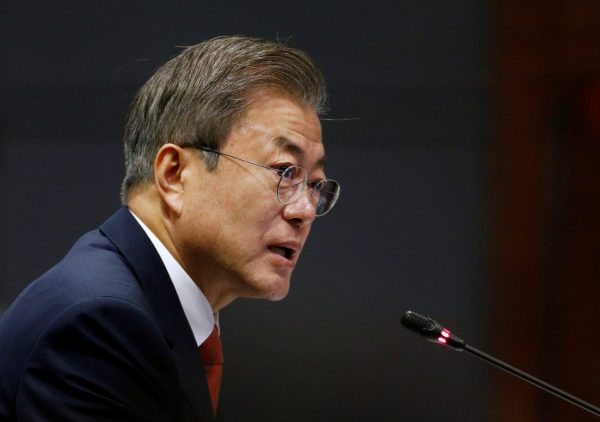Despite this progress, the harsh realities of South Korean society remain and are materialising into prodigious challenges to Moon’s leadership.
Negative economic indicators are jeopardising the President’s leadership. The number of newly hired workers in July 2018 was only 5000 — flat from the number a year ago and the lowest on record for the last eight years and six months. For the seventh consecutive month, the number of unemployed individuals exceeded 1 million.
The shock of unemployment is connected to worsening trends in income distribution. As of the second quarter of 2018, income for the top 20 per cent of households increased by 10.3 per cent compared to the previous quarter, while income for the bottom 20 per cent decreased by 7.6 per cent. Likewise, the number of jobs increased for the upper income bracket but decreased sharply for the lower income bracket. Both the Gini coefficient and the relative poverty rate rose, as did the unemployment rate for young adults aged 25–34, which hit 6.4 per cent — the highest since 1999.
What caused this situation?
Moon’s first scheduled visit after being sworn in was to Incheon International Airport — a state-owned corporation — in May 2017, where he promised to regularise 10,000 temporary employees and declared the end of irregular employment in the public sector. The President, who responded to the grievous situation faced by irregular workers by championing the philosophy of the ’people first’, was warmly received by citizens and workers alike.
At the time, others voiced their concerns over the unrealistic nature of these policies. Those who spoke out worried that such high expectations would turn into deeper disappointments. They aired their concerns not simply because of political differences, but because they believed that many unexpected economic constraints and institutional complexities would inevitably emerge. The policies should have been premised on a careful roadmap and a detailed action plan to overcome these unintended consequences.
This style of inexperienced and rigid policy implementation is also reflected in the minimum wage increase and the shortening of working hours. In 2018, the hourly minimum wage was raised by 16.4 per cent to 7530 won (US$6.70) and is expected to increase by 10.9 per cent to 8350 won (US$7.40) by 2019. Effective from July 2018, maximum working hours were reduced from 68 hours to 52 hours per week.
These policies were Moon’s signature campaign pledges. But they also produced unintended results. The wage increase was offset by inflation and employers pre-emptively reduced employment out of fear over the scheduled increases in labour costs. Small- and medium-sized enterprises (SMEs) with weaker balance sheets were hit hard, as were the self-employed, whose rate of closures rose to 88 per cent.
The reduction in working hours also made management of SMEs more difficult and caused a paradoxical phenomenon in which the incomes of many SME workers actually declined. In the end, both policies — regardless of their good intent — created a situation where everybody lost, and the poor and socially underprivileged had to fight over depleted resources.
Moon’s government is caught in a dilemma, stuck between the resistance of vested interest groups and the demands of its supporters. Despite the candlelight protests that paved the way for Moon’s ascent to the Blue House, the interests of these deeply rooted forces in South Korean society remain intact within conglomerates, the bureaucracy, unions, political parties and even civil society.
The National Pension System is one representative case in which prescriptions for reform repeatedly meet resistance from vested interest groups. As of 2016, pensions for government officials and the military, which on average are six times the national pension per capita, are subsidised by the government to the tune of 3.6 trillion won (US$3 billion). The country’s recurring issue of inequity is not helped by the resistance of such groups to reform of this scheme.
On the other hand, the percentage of those who pay national pension premiums is low at 58.8 per cent of the economically active population. But the Moon administration is averse to increasing the ratio of premium payers and reducing the number of those who have until now avoided payments because it is afraid of a backlash among its support base.
Reform of governance structures to improve the performance and enhance the transparency of the National Pension System has consequently stalled. Such reforms are an urgent task for South Korea, which is already facing a population crisis and the burdens of an ageing society. But right now, there is no figure of leadership that is able to both overcome the forces of vested interest and reach an understanding from the government’s supporters for needed reform.
Will Moon’s leadership be remembered as a ‘new start’? Or will it be buried in the rough waves of Korean society without overcoming the structures and practices of the past? The answer depends on whether Moon succeeds in dismantling the country’s unfair and exclusive structures of vested interest. Only this will encourage the creation of a fair and harmonious society.
Sang-young Rhyu is a Professor at the Graduate School of International Studies at Yonsei University and the Editor of the East Asia Foundation Policy Debates.
A longer version of this article originally appeared here on Global Asia.

